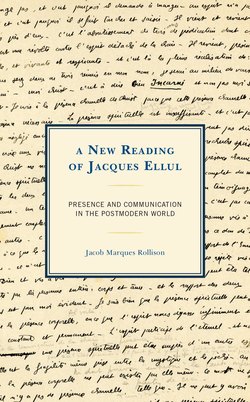Читать книгу A New Reading of Jacques Ellul - Jacob Marques Rollison - Страница 12
На сайте Литреса книга снята с продажи.
Ellul—A “Religious Postmodernist”?
ОглавлениеThough he ignores Ellul’s theology, Vincent establishes Ellul as closer to structuralist tradition than his readers may be wont to think. This book addresses Ellul’s theology, and it is precisely here that things become more interesting. Fasching, who does include Ellul’s theology (which he knows very well) dubs Ellul’s theology “post-Christian,” positioning Ellul and Lyotard on the same side of the barricade.[44] With a nod to Lyotard’s The Postmodern Condition, Fasching focuses on the liberating force of decentered metanarratives, by which “Globalization created the postmodern city . . . The collapse of a metanarratives does not mean they disappear but that they function differently.”[45] Fasching traces this collapse to Nietzsche, suggesting that “the social sciences did not just report the death of God, they provided the knife with which God was murdered. In such an apocalyptic world, Nietzsche argued, norms would have to be replaced by the will to power and the transvaluation of all values . . .”[46]
For Fasching, “Ellul’s work can be understood as an exercise in postmodern, post-Christian theology.”[47] Viewing The New Demons and Apocalypse respectively as the “Rosetta stone of Ellul’s authorship” and Ellul‘s “crowning theological work,” Fasching compares Ellul’s critical approach to Derrida’s deconstruction, juxtaposing Derrida’s late work and Ellul.[48] Crucially, Fasching claims: “Ellul is a religious postmodernist. His religious postmodernism is able to deconstruct the endless dialectic of absolutism and relativism (the totalist temptations that feed each other in a technicist civilization) that plagues secular postmodernism and so exorcise the “new demons” of the postmodern world.”[49] Fasching develops this ‘religious postmodernist’ Ellul, emphasizing the repeated biblical injunction towards hospitality: “Hospitality is the direct embodiment of the holy” and “God is not found in sameness but in difference.”[50] Crucially, Fasching interprets a phrase in Ellul’s Humiliation of the Word (“. . . projects, utopias, intentions and doctrines—all these belong to the order of truth, and are known and created by the word”) as a “startling statement,” a “rehabilitation” of utopia.[51] He concludes the section thus: “Ellul’s apocalyptic critique. . . opens the door to the participation of Christians in the invention of a global ethic that might assist in helping human beings of all religions and cultures give birth to their utopian hopes.”[52] Finally, Fasching proposes the postmodern city realized as utopia/eschaton: “Even the contemporary postmodern global technicist city, once desacralized, becomes open to its truly utopian destiny as the City of God, in which (to paraphrase the story of Pentecost) each speaks his or her own language and yet each is understood by all.”[53]
All of the secondary treatments mentioned have treated Ellul and structuralism as parallel lines, intersecting thematically but never actually. This is demonstrable with reference to Lyotard’s The Postmodern Condition: despite various comparisons to Ellul’s thought, the secondary literature never notes that Lyotard’s book cites Ellul’s The Technological Society and The Technological System.[54] The present book, by contrast, sees Ellul as contemporary with structuralism, seeking Ellul’s approach to these thinkers and his explicit and implicit responses to them.
